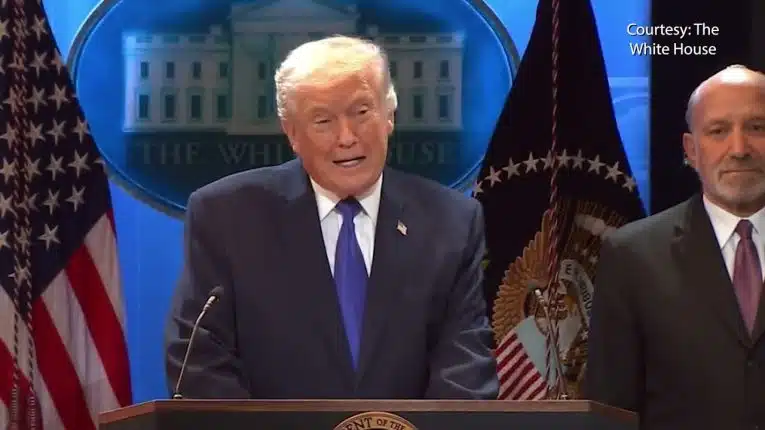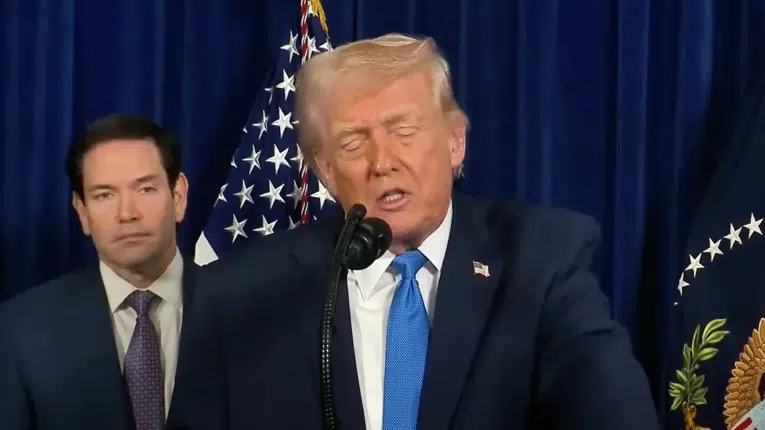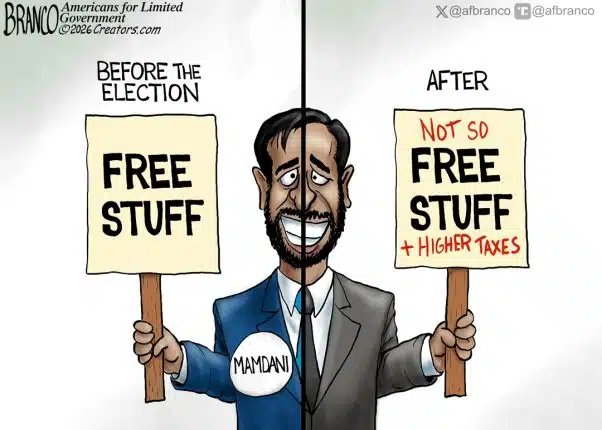The people of Detroit know the real cost of Hillary Clinton's free trade policies. pic.twitter.com/OoatUvhEc9
— Bernie Sanders (@BernieSanders) March 3, 2016
Could the international trade issue be Hillary Clinton’s Achilles’ heel in November?
In the Flint, Mich. CNN debate on March 6, the issue came up in fierce exchanges between Clinton and rival Sen. Bernie Sanders (D-Vt.).
Moderator Anderson Cooper called attention to a post on Twitter by Sanders on March 3, that showed bombed out buildings in Detroit, Mich. with the ominous message, “The people of Detroit know the real cost of Hillary Clinton’s free trade policies.”
“It says the people of Detroit know the real costs of Hillary Clinton’s free trade policies. It shows pictures of crumbling buildings. It seems like you’re blaming her for the situation in Detroit,” Cooper remarked.
“I’m blaming the trade policies,” Sanders responded in part, blaming the shifting of jobs and production overseas as a result of the trade deals.
Cooper did not want to let it go, however, countering, “But, you’re calling them Hillary Clinton’s failed trade policies.”
“Well, Hillary Clinton, and everybody else who supported these disastrous trade policies. She wasn’t alone. We have many, many Republicans and far too many Democrats who supported these disastrous trade policies,” Sanders replied. At that point, Cooper stopped debating with Sanders. Why?
Because as far as Clinton’s positions go, she was in favor of NAFTA in the 1990s, supported China’s bid to enter the World Trade Organization (WTO) and supported permanent normal trade relations with China in 2000 when she was running for the New York Senate seat after the death of Pat Moynihan.
Interesting, material distributed by the Sanders campaign on this issue cites two identical sources of Clinton’s positions, with the same exact headings and descriptions, as material distributed by the Barack Obama campaign in 2008.
The first reads, “Hillary claimed China’s entry into the World Trade Organization would be good for American workers despite the already massive trade deficit with China,” citing an April 26, 2000 report from CNN, same as what Obama put out in 2008. That report quotes Clinton stating, “[O]n balance, I’ve looked at this, I’ve studied it, I think it is in the interests of America and American workers that we provide the option for China to go into the WTO.”
And the second citation, a May 25, 2000 report from AFP that stated, “Senate candidate Hillary Clinton said Thursday she supported permanent normal trade relations for China, but slammed Beijing’s restrictive birthrate policies.” Just like Obama put out there.
For her part, Clinton did not deny her prior positions on these issues, instead choosing to highlight an increase in manufacturing in Michigan during the 1990s boom. But she did not at all address what happened after that, particularly, what happened after China was granted permanent trade relations.
The U.S. market share of manufacturing exports worldwide as a percent of worldwide exported manufactures peaked in 1999 at 13.48 percent, and has been declining ever since, according to data compiled by the World Bank. By 2014, it was down to 7.45 percent.
As U.S. market share of manufacturing rose worldwide in the late 1980s and 1990s, so too did labor participation. Once the U.S. was losing market share, labor participation collapsed, from more than a 77 percent rate in the late 1990s to just 72.6 percent in 2015, representing more than 10 million people who have either left the labor force or never entered on a net basis.
But so far, the issue is not working out so well for Sanders.
Yet it still may hurt Clinton in the general election, particularly if she ends up in a battle against unconventional Republican insurgents such as Donald Trump or Ted Cruz, who both oppose the Trans-Pacific Partnership (TPP) trade agreement under consideration in Congress.
As Secretary of State, Clinton supported the Pacific trade deal in an Australia speech in Nov. 2015, saying, “our economies are entwined, and we need to keep upping our game both bilaterally and with partners across the region through agreements like the Trans-Pacific Partnership or TPP. Australia is a critical partner. This TPP sets the gold standard in trade agreements to open free, transparent, fair trade, the kind of environment that has the rule of law and a level playing field. And when negotiated, this agreement will cover 40 percent of the world’s total trade and build in strong protections for workers and the environment.”
Clinton added, “If we do this right, and that’s what we’re trying to do, then globalization, which is inevitable, can become a race to the top with rising standards of living and more broadly shared prosperity. Now, this is what I call jobs diplomacy, and that’s what I’ve been focused on in part as Secretary of State.”
While Clinton has since rejected her own position in favor of TPP, her prior support could prove lethal with, say, the union vote in November, the rank and file of which is currently backing Sanders in large numbers
Once the Democrats throw Sanders under the bus, where do the unions go? Big question. If Republicans remain consistent with where the two front-runners are, against TPP, it could put the working class vote in play for the first time since the Reagan coalition.
That coalition, with Reagan Democrats, fell apart in 1992 — with millions of votes going to Ross Perot — over the trade issue. Now, with Clinton and her trade issue problems, those votes could be in play once more. In factory states like Ohio, needed for an electoral college majority, it will matter. Something to consider as the process moves forward.
Robert Romano is the senior editor of Americans for Limited Government.






